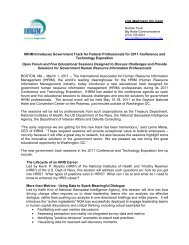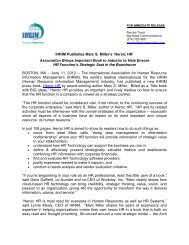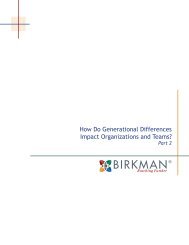KPMG Sourcing Advisory 3Q12 Global Pulse Survey - KPMG Institutes
KPMG Sourcing Advisory 3Q12 Global Pulse Survey - KPMG Institutes
KPMG Sourcing Advisory 3Q12 Global Pulse Survey - KPMG Institutes
You also want an ePaper? Increase the reach of your titles
YUMPU automatically turns print PDFs into web optimized ePapers that Google loves.
<strong>KPMG</strong> <strong>Sourcing</strong><br />
<strong>Advisory</strong> <strong>3Q12</strong><br />
<strong>Global</strong> <strong>Pulse</strong> <strong>Survey</strong><br />
Trends in shared services, outsourcing, and<br />
third-party business and IT service markets,<br />
gleaned from <strong>KPMG</strong>’s own field advisors<br />
and leading global service providers.<br />
kpmg.com
Introduction<br />
<strong>KPMG</strong> is pleased to release the findings from its <strong>KPMG</strong> <strong>3Q12</strong> global <strong>Sourcing</strong> <strong>Advisory</strong><br />
<strong>Pulse</strong> survey. The <strong>Pulse</strong> surveys provide insights into trends and projections in enduser<br />
organizations’ usage of global business services (GBS). The learnings are gleaned<br />
from <strong>KPMG</strong> International (<strong>KPMG</strong>I) firms’ advisors, who work closely with end-user<br />
organizations that are actively exploring or undertaking domestic, near and offshore<br />
shared services and outsourcing, and other service delivery initiatives, as well as<br />
from leading global business and IT service providers.<br />
The <strong>Sourcing</strong> <strong>Advisory</strong> <strong>Pulse</strong> surveys are part of a broad family of <strong>KPMG</strong> <strong>Pulse</strong><br />
surveys. This collective research program focuses on GBS market trending in specific<br />
geographies such as China or South Africa, functional areas such as real estate and<br />
facilities management (REFM), and specialized constituencies such as third-party<br />
legal counsel that advise buyer organizations on outsourcing. It examines related<br />
key topics such as cloud computing and human resources (HR) transformation and<br />
vertical industry business trends.<br />
Since their inception in 2004, the global <strong>Sourcing</strong> <strong>Advisory</strong> <strong>Pulse</strong> surveys have<br />
yielded insightful analyses of current and ongoing market trends in the use,<br />
deployment, and delivery of business and IT services. They capture changes in<br />
demand, usage levels, future adoption plans, and related key market indicators. They<br />
highlight the changes, and the direction of change, in the GBS market as a whole. The<br />
surveys focus on where the market is going and how that direction is changing—or<br />
not—as compared to prior quarters and years.<br />
This edition of the global <strong>Sourcing</strong> <strong>Advisory</strong> <strong>Pulse</strong> surveys reflects GBS market<br />
activity during <strong>3Q12</strong>, as well as projections and predictions for the balance of 2012.<br />
Topics explored include:<br />
• Outsourcing deal pricing, service provider profitability, and scope<br />
• Drivers for GBS delivery improvement efforts<br />
• GBS demand and adoption trends<br />
• Annual review of trends in the usage of global shared services<br />
• Annual review of outsourcing transition trends and challenges<br />
2 Shared Services and Outsourcing <strong>Advisory</strong> / <strong>KPMG</strong> <strong>Sourcing</strong> <strong>Advisory</strong> <strong>3Q12</strong> <strong>Global</strong> <strong>Pulse</strong> <strong>Survey</strong> / October 2012<br />
© 2012 <strong>KPMG</strong> International Cooperative (“<strong>KPMG</strong> International”). <strong>KPMG</strong> International provides no client services<br />
and is a Swiss entity with which the independent member firms of the <strong>KPMG</strong> network are affiliated.
The <strong>Pulse</strong> surveys focus on end-user organizations’ global use of shared services,<br />
outsourcing, and other third-party services across the following functional areas:<br />
• Customer care/call center<br />
• Finance and accounting (F&A)<br />
• Human resources (HR)<br />
• Information technology (IT)<br />
• Knowledge process outsourcing (KPO)<br />
• Procurement/source to pay<br />
• Real estate and facilities management (REFM)<br />
• Vertical industry business services<br />
The following leading global business and IT service providers<br />
participated in the <strong>3Q12</strong> survey:<br />
• Accenture<br />
• BT <strong>Global</strong> Services<br />
• CaliberPoint<br />
• Capgemini<br />
• CGI<br />
• CSC<br />
• Dell<br />
• Fujitsu<br />
• Genpact<br />
• HCL Technologies<br />
• HP<br />
• IBM<br />
• Infosys<br />
• NorthgateArinso<br />
• Syntel<br />
• T-Systems<br />
• TCS<br />
• Unisys<br />
• Xerox<br />
Questions or comments regarding the <strong>Pulse</strong> surveys should be directed to<br />
Stan Lepeak, director, <strong>Global</strong> Research, <strong>KPMG</strong> Management Consulting, at<br />
slepeak@kpmg.com or +1 203-458-0677.<br />
Shared Services and Outsourcing <strong>Advisory</strong> / <strong>KPMG</strong> <strong>Sourcing</strong> <strong>Advisory</strong> <strong>3Q12</strong> <strong>Global</strong> <strong>Pulse</strong> <strong>Survey</strong> / October 2012 3<br />
© 2012 <strong>KPMG</strong> International Cooperative (“<strong>KPMG</strong> International”). <strong>KPMG</strong> International provides no client services<br />
and is a Swiss entity with which the independent member firms of the <strong>KPMG</strong> network are affiliated.
Table of Contents<br />
IManagement Summary 1<br />
II Highlights 2<br />
Market Conditions 3<br />
III<br />
IV Trends 4<br />
Outsourcing Market Macro Trends 26<br />
<strong>Global</strong> Shared Services Trends 27<br />
V<br />
Learn<br />
Advisors: Top Approaches to Improve Service Delivery Capabilities 14<br />
Business and IT Service Providers Market Demand Assessments 18<br />
Current Market Deal Characteristics: Service Providers’ Perspectives 22<br />
Outsourcing Transition Trends and Challenges 38<br />
More 5<br />
Where to Learn More about <strong>Global</strong> <strong>Sourcing</strong> Market Trends 42<br />
Appendix 43<br />
4 Shared Services and Outsourcing <strong>Advisory</strong> / <strong>KPMG</strong> <strong>Sourcing</strong> <strong>Advisory</strong> <strong>3Q12</strong> <strong>Global</strong> <strong>Pulse</strong> <strong>Survey</strong> / October 2012<br />
© 2012 <strong>KPMG</strong> International Cooperative (“<strong>KPMG</strong> International”). <strong>KPMG</strong> International provides no client services<br />
and is a Swiss entity with which the independent member firms of the <strong>KPMG</strong> network are affiliated.
Shared Services and Outsourcing <strong>Advisory</strong> / <strong>KPMG</strong> <strong>Sourcing</strong> <strong>Advisory</strong> <strong>3Q12</strong> <strong>Global</strong> <strong>Pulse</strong> <strong>Survey</strong> / October 2012 5<br />
© 2012 <strong>KPMG</strong> International Cooperative (“<strong>KPMG</strong> International”). <strong>KPMG</strong> International provides no client services<br />
and is a Swiss entity with which the independent member firms of the <strong>KPMG</strong> network are affiliated.
Management Summary<br />
<strong>3Q12</strong> <strong>Global</strong> <strong>Pulse</strong> <strong>Survey</strong> | Summary<br />
Results from the <strong>3Q12</strong> edition of the quarterly global <strong>Sourcing</strong> Advisor<br />
<strong>Pulse</strong> surveys find that the mix of service delivery models organizations<br />
are using in their growing portfolio of GBS efforts continues to shift and<br />
evolve. Demand for outsourcing, especially generic back-office or<br />
“horizontal” outsourcing remains weak by historical standards,<br />
according to both third-party business and IT service providers and <strong>KPMG</strong>I<br />
firms’ advisors and consultants polled. Buyer organizations’ appetites<br />
to undertake any sort of change efforts became more muted in the<br />
quarter, representative of an increasingly pervasive “wait and see”<br />
attitude in uncertain economic times. Additionally, while offshore<br />
outsourcing remains a dominant service delivery model, organizations<br />
continue to exhibit greater relative interest and investment on both<br />
onshore and nearshore outsourcing and captive shared services<br />
centers.<br />
Advisors: Demand by Service Delivery<br />
Model, Past 1–2 Quarters, Net Change in Demand<br />
6 Shared Services and Outsourcing <strong>Advisory</strong> / <strong>KPMG</strong> <strong>Sourcing</strong> <strong>Advisory</strong> <strong>3Q12</strong> <strong>Global</strong> <strong>Pulse</strong> <strong>Survey</strong> / October 2012<br />
© 2012 <strong>KPMG</strong> International Cooperative (“<strong>KPMG</strong> International”). <strong>KPMG</strong> International provides no client services<br />
and is a Swiss entity with which the independent member firms of the <strong>KPMG</strong> network are affiliated.
<strong>3Q12</strong> <strong>Global</strong> <strong>Pulse</strong> <strong>Survey</strong> | Management Summary<br />
As covered in last quarter’s <strong>Pulse</strong>, there continues a slow death of the<br />
traditional one-dimensional model of global outsourcing focused<br />
purely on labor arbitrage. This is in part due to shrinking wage disparities<br />
across markets, but also because aggressive GBS adopters have already<br />
driven extensive costs out of their operations. Future cost savings will<br />
need to come from greater process automation, more streamlined and<br />
efficient processes, greater economies of GBS scale, and better alignment<br />
between GBS and commercial operating models. Greater GBS maturity,<br />
often in the form of better governance and commercial orientation,<br />
will drive cost savings, but more importantly, bring greater value to the<br />
business. While the quest for greater maturity is nothing new, the rigor<br />
and focus on doing so continues to intensify and become more formalized.<br />
<strong>KPMG</strong> is conducting a separate and ongoing market research effort on<br />
GBS maturity .<br />
<strong>KPMG</strong> GBS Maturity Model<br />
Value Capture and Performance Sustainability<br />
Level 5 – Integrated<br />
<strong>Global</strong>ly integrated services portfolio with aggressive use of<br />
alternative and mixed delivery models<br />
Level 4 – Strategic<br />
Optimized balance of internal and external delivery<br />
capabilities, global sourcing with multifunction focus<br />
Level 3 – Optimized<br />
Traditional outsourcing relationships with global delivery;<br />
non-integrated internal shared services capabilities<br />
Level 2 – Rationalized<br />
Single function shared services with tactical onshore or<br />
offshore provider relationships<br />
Level 1 – Sub-Optimized<br />
Decentralized and duplicative functions; little central control<br />
over business support services<br />
The Journey . . . Development Stages . . . Time<br />
Shared Services and Outsourcing <strong>Advisory</strong> / <strong>KPMG</strong> <strong>Sourcing</strong> <strong>Advisory</strong> <strong>3Q12</strong> <strong>Global</strong> <strong>Pulse</strong> <strong>Survey</strong> / October 2012 7<br />
© 2012 <strong>KPMG</strong> International Cooperative (“<strong>KPMG</strong> International”). <strong>KPMG</strong> International provides no client services<br />
and is a Swiss entity with which the independent member firms of the <strong>KPMG</strong> network are affiliated.
<strong>3Q12</strong> <strong>Global</strong> <strong>Pulse</strong> <strong>Survey</strong> | Management Summary<br />
This quarter’s <strong>Pulse</strong> analyzes trends in buyer’s usage of global shared<br />
services centers as a core GBS component. Relative demand for<br />
domestic shared services centers has increased over the past year,<br />
though buyers maintain an increasingly global footprint for their shared<br />
services operations. Finance and accounting and human resources are<br />
the business functions most commonly placed into a shared services<br />
environment, though there is an increased interest in using shared<br />
services to deliver sourcing and procurement services. Overall, <strong>KPMG</strong><br />
finds increased buyer interest in placing a broad range of business<br />
activities into a shared services environment including strategic work such<br />
data analytics and sales, and marketing support functions.<br />
Advisors: Change in Demand for Domestic Shared Services Centers Past 12 Months<br />
6% 48% 45%<br />
Down<br />
Flat<br />
Up<br />
8 Shared Services and Outsourcing <strong>Advisory</strong> / <strong>KPMG</strong> <strong>Sourcing</strong> <strong>Advisory</strong> <strong>3Q12</strong> <strong>Global</strong> <strong>Pulse</strong> <strong>Survey</strong> / October 2012<br />
© 2012 <strong>KPMG</strong> International Cooperative (“<strong>KPMG</strong> International”). <strong>KPMG</strong> International provides no client services<br />
and is a Swiss entity with which the independent member firms of the <strong>KPMG</strong> network are affiliated.
<strong>3Q12</strong> <strong>Global</strong> <strong>Pulse</strong> <strong>Survey</strong> | Management Summary<br />
The <strong>Pulse</strong> finds that service provider pipeline growth for outsourcing<br />
services fell to its lowest level measured in the <strong>Pulse</strong> survey, though there<br />
is guarded optimism for improvement over the balance of the year. There are<br />
a variety of factors negatively impacting outsourcing demand, including more<br />
focus on shared services, negative market conditions in the Eurozone, and<br />
near saturation in certain account segments. The use of alternative options<br />
(e.g., cloud) to traditional outsourcing is another gating factor for outsourcing<br />
demand, especially among providers with immature cloud offerings. Buyer<br />
tight rein over discretionary spending remains a barrier to growth. ITO,<br />
more specialized BPO in the form of specific vertical industry services, and<br />
multitower deals are the service areas that continue to exhibit the strongest<br />
levels of demand, though even here, while strategic, deals are often smaller<br />
than historical first-generation horizontal outsourcing efforts.<br />
Service Providers: Pipeline Growth Last Quarter<br />
55% 76% 61% 68%<br />
61%<br />
38%<br />
Advisors: Top Approaches to Improve Service Delivery Capabilities<br />
2Q11<br />
3Q11<br />
4Q11<br />
1Q12<br />
2Q12<br />
<strong>3Q12</strong><br />
Shared Services and Outsourcing <strong>Advisory</strong> / <strong>KPMG</strong> <strong>Sourcing</strong> <strong>Advisory</strong> <strong>3Q12</strong> <strong>Global</strong> <strong>Pulse</strong> <strong>Survey</strong> / October 2012 9<br />
© 2012 <strong>KPMG</strong> International Cooperative (“<strong>KPMG</strong> International”). <strong>KPMG</strong> International provides no client services<br />
and is a Swiss entity with which the independent member firms of the <strong>KPMG</strong> network are affiliated.
Highlights<br />
<strong>KPMG</strong> International Firms’ Shared Services and Outsourcing Advisor Highlights<br />
10 Shared Services and Outsourcing <strong>Advisory</strong> / <strong>KPMG</strong> <strong>Sourcing</strong> <strong>Advisory</strong> <strong>3Q12</strong> <strong>Global</strong> <strong>Pulse</strong> <strong>Survey</strong> / October 2012<br />
© 2012 <strong>KPMG</strong> International Cooperative (“<strong>KPMG</strong> International”). <strong>KPMG</strong> International provides no client services<br />
and is a Swiss entity with which the independent member firms of the <strong>KPMG</strong> network are affiliated.
Third-Party Business and IT Service Provider Highlights<br />
Shared Services and Outsourcing <strong>Advisory</strong> / <strong>KPMG</strong> <strong>Sourcing</strong> <strong>Advisory</strong> <strong>3Q12</strong> <strong>Global</strong> <strong>Pulse</strong> <strong>Survey</strong> / October 2012 11<br />
© 2012 <strong>KPMG</strong> International Cooperative (“<strong>KPMG</strong> International”). <strong>KPMG</strong> International provides no client services<br />
and is a Swiss entity with which the independent member firms of the <strong>KPMG</strong> network are affiliated.
Market Conditions<br />
<strong>3Q12</strong> <strong>Global</strong> <strong>Pulse</strong> <strong>Survey</strong> | <strong>KPMG</strong> Firms’ Advisors: Top Approaches<br />
to Improve Service Delivery Capabilities<br />
<strong>KPMG</strong> polled its global network of shared services and outsourcing advisors (<strong>KPMG</strong> consultants working<br />
with clients in the field) as to the top approaches that buyers are employing today to improve service<br />
delivery performance, as well as to help minimize or reduce service delivery costs (see Figure 1).<br />
• Sixty-seven percent of advisors, down three percent<br />
from last quarter, cited improve current shared<br />
services and outsourcing governance processes<br />
and capabilities as the most common approach<br />
undertaken to improve service delivery capabilities.<br />
This has been the top-rated response for several<br />
quarters, and reflects market awareness of the<br />
importance of sourcing governance to GBS success.<br />
Figure 1 | Advisors: Top Approaches to Improve Service Delivery Capabilities<br />
• The second most commonly cited approach was<br />
internal process improvement or reengineering<br />
efforts, identified by 46 percent of advisors. Ranking<br />
a close third, and selected by 44 percent of advisors,<br />
was use/expansion of shared services with use/<br />
expansion of ITO.<br />
• Improving governance processes and capabilities<br />
was the top cited approach by all classes of advisors<br />
(see Appendix for a breakout of <strong>KPMG</strong> firms’<br />
advisors’ responses by geographic region and by<br />
functional area of focus). The expansion of shared<br />
services usage was, as to be expected, more<br />
frequently cited by advisors that support business<br />
process versus IT work.<br />
12 Shared Services and Outsourcing <strong>Advisory</strong> / <strong>KPMG</strong> <strong>Sourcing</strong> <strong>Advisory</strong> <strong>3Q12</strong> <strong>Global</strong> <strong>Pulse</strong> <strong>Survey</strong> / October 2012<br />
© 2012 <strong>KPMG</strong> International Cooperative (“<strong>KPMG</strong> International”). <strong>KPMG</strong> International provides no client services<br />
and is a Swiss entity with which the independent member firms of the <strong>KPMG</strong> network are affiliated.
<strong>3Q12</strong> <strong>Global</strong> <strong>Pulse</strong> <strong>Survey</strong> | Market Conditions<br />
Figure 2 | Advisors: Top Functional Focus Areas for Service Delivery Improvement Efforts<br />
<strong>KPMG</strong> firms’ sourcing advisors were asked in which functional areas buyers are today<br />
applying the approaches outlined in Figure 1 to improve service delivery capabilities (see<br />
Figure 2). IT was the most commonly cited functional area, identified by 65 percent of<br />
advisors, up one percent from last quarter, followed by F&A, selected by 56 percent of<br />
advisors. There was general consensus on these rankings across geographies with<br />
advisors serving the Asia-Pacific region more bullish on most categories of business<br />
process outsourcing<br />
Shared Services and Outsourcing <strong>Advisory</strong> / <strong>KPMG</strong> <strong>Sourcing</strong> <strong>Advisory</strong> <strong>3Q12</strong> <strong>Global</strong> <strong>Pulse</strong> <strong>Survey</strong> / October 2012 13<br />
© 2012 <strong>KPMG</strong> International Cooperative (“<strong>KPMG</strong> International”). <strong>KPMG</strong> International provides no client services<br />
and is a Swiss entity with which the independent member firms of the <strong>KPMG</strong> network are affiliated.
<strong>3Q12</strong> <strong>Global</strong> <strong>Pulse</strong> <strong>Survey</strong> | Market Conditions<br />
<strong>KPMG</strong> firms’ advisors were next polled on the change in demand or usage<br />
levels over the past one to two quarters, and expected change in usage<br />
levels over the coming one to two quarters, across four different categories<br />
of business and IT services delivery models employed in service delivery<br />
improvement efforts. These categories are BPO, ITO, shared services and internal<br />
process improvement efforts (see Figures 3, 4, and 5).<br />
• The greatest growth in demand was once again cited for shared services efforts,<br />
identified by 41 percent of advisors, down four percent from last quarter (see<br />
Figure 3). The percentage of advisors citing growth in demand for internal process<br />
improvement fell again from 44 to 40 percent. The number of advisors citing demand<br />
growth for ITO also fell from 38 to 30 percent, while BPO demand growth remained low<br />
at 20 percent of advisors. Twelve percent of advisors cited decreasing levels of demand<br />
for BPO. These weaker BPO growth expectations primarily reflect less demand for more<br />
traditional, horizontal BPO (e.g., FAO, HRO, and source to pay) versus more specialized,<br />
industry-specific BPO, where demand is stronger but deals are smaller and more diverse.<br />
In general, however, buyer organizations’ appetites to undertake any sort of change effort<br />
became more muted, representative of an increasingly pervasive “wait and see” attitude in<br />
uncertain economic times and in some markets an election year.<br />
• Looking forward over the next one to two quarters (see Figure 4), the greatest expected growth<br />
is for shared services efforts, identified by 49 percent of advisors, followed by, and identified by 48<br />
percent of advisors, unchanged from last quarter. Expectations for increased usage of ITO remained<br />
dropped from 40 to 30 percent, while BPO demand growth expectations slipped from 33 to 28<br />
percent of advisors polled.<br />
• Figure 5 illustrates the net change in demand (up minus down citations) by <strong>KPMG</strong> firms’ advisors over<br />
the past six quarters,<br />
14 Shared Services and Outsourcing <strong>Advisory</strong> / <strong>KPMG</strong> <strong>Sourcing</strong> <strong>Advisory</strong> <strong>3Q12</strong> <strong>Global</strong> <strong>Pulse</strong> <strong>Survey</strong> / October 2012<br />
© 2012 <strong>KPMG</strong> International Cooperative (“<strong>KPMG</strong> International”). <strong>KPMG</strong> International provides no client services<br />
and is a Swiss entity with which the independent member firms of the <strong>KPMG</strong> network are affiliated.
<strong>3Q12</strong> <strong>Global</strong> <strong>Pulse</strong> <strong>Survey</strong> | Market Conditions<br />
Figure 3 | Advisors: Demand by Service Delivery Model, Past 1–2 Quarters<br />
Figure 5 | Advisors: Demand by Service Delivery<br />
Model, Past 1–2 Quarters,<br />
Net Change in Demand<br />
Figure 4 | Advisors: Demand by Service Delivery Model, Next 1–2 Quarters<br />
Shared Services and Outsourcing <strong>Advisory</strong> / <strong>KPMG</strong> <strong>Sourcing</strong> <strong>Advisory</strong> <strong>3Q12</strong> <strong>Global</strong> <strong>Pulse</strong> <strong>Survey</strong> / October 2012 15<br />
© 2012 <strong>KPMG</strong> International Cooperative (“<strong>KPMG</strong> International”). <strong>KPMG</strong> International provides no client services<br />
and is a Swiss entity with which the independent member firms of the <strong>KPMG</strong> network are affiliated.
<strong>3Q12</strong> <strong>Global</strong> <strong>Pulse</strong> <strong>Survey</strong> | Market Conditions<br />
Business and IT Service Providers<br />
Market Demand Assessments<br />
<strong>KPMG</strong> polled leading global business and IT service providers on the current and expected<br />
growth levels in their pipelines for services deals. Providers polled this quarter were much<br />
more bearish regarding new deal pipeline growth projections than they were over the past<br />
several quarters, reflecting the increasingly clogged nature of pipeline in light of buyer<br />
uncertainty and hesitancy.<br />
• Thirty-eight percent of service providers cited<br />
pipeline growth over the past quarter, a decrease of<br />
23 percent from last quarter’s <strong>Pulse</strong> (see Figure 6),<br />
and the lowest level measured over the life of the<br />
<strong>Pulse</strong> as conducted by <strong>KPMG</strong>. It is important to note<br />
that the <strong>Pulse</strong> surveys measure change in pipeline<br />
growth levels, not absolute pipeline size or revenue<br />
levels.<br />
Figure 6 | Service Providers: Pipeline Growth Last Quarter<br />
16 Shared Services and Outsourcing <strong>Advisory</strong> / <strong>KPMG</strong> <strong>Sourcing</strong> <strong>Advisory</strong> <strong>3Q12</strong> <strong>Global</strong> <strong>Pulse</strong> <strong>Survey</strong> / October 2012<br />
© 2012 <strong>KPMG</strong> International Cooperative (“<strong>KPMG</strong> International”). <strong>KPMG</strong> International provides no client services<br />
and is a Swiss entity with which the independent member firms of the <strong>KPMG</strong> network are affiliated.
<strong>3Q12</strong> <strong>Global</strong> <strong>Pulse</strong> <strong>Survey</strong> | Market Conditions<br />
• Fifty-nine percent of providers expected the pace<br />
of customer demand for business and IT services<br />
to increase over the next one to two quarters (see<br />
Figure 7), an increase of eight percent from last<br />
quarter, with 10 percent of providers polled expecting<br />
demand to decline.<br />
Figure 7 | Service Providers: Demand Next 1–2 Quarters<br />
Shared Services and Outsourcing <strong>Advisory</strong> / <strong>KPMG</strong> <strong>Sourcing</strong> <strong>Advisory</strong> <strong>3Q12</strong> <strong>Global</strong> <strong>Pulse</strong> <strong>Survey</strong> / October 2012 17<br />
© 2012 <strong>KPMG</strong> International Cooperative (“<strong>KPMG</strong> International”). <strong>KPMG</strong> International provides no client services<br />
and is a Swiss entity with which the independent member firms of the <strong>KPMG</strong> network are affiliated.
<strong>3Q12</strong> <strong>Global</strong> <strong>Pulse</strong> <strong>Survey</strong> | Market Conditions<br />
Service providers polled, similar to <strong>KPMG</strong> firms’<br />
sourcing advisors, cited IT as the strongest functional<br />
area of market demand. Sixty-four percent of providers<br />
polled, up nine percent from last quarter, identified IT as<br />
the top area of demand (see Figure 8). Next was FAO<br />
at 36 percent. <strong>KPMG</strong> recently participated in a webcast<br />
with HfS Research analyzing FAO market trends. A<br />
replay of this webcast is available for review to gain<br />
greater insights into evolving trends in the global FAO<br />
market. The third highest cited category was bundled<br />
business process and IT deals followed by vertical<br />
industry-specific services, a new category added last<br />
quarter.<br />
Figure 8 | Service Providers: Top Functional Areas of Demand<br />
18 Shared Services and Outsourcing <strong>Advisory</strong> / <strong>KPMG</strong> <strong>Sourcing</strong> <strong>Advisory</strong> <strong>3Q12</strong> <strong>Global</strong> <strong>Pulse</strong> <strong>Survey</strong> / October 2012<br />
© 2012 <strong>KPMG</strong> International Cooperative (“<strong>KPMG</strong> International”). <strong>KPMG</strong> International provides no client services<br />
and is a Swiss entity with which the independent member firms of the <strong>KPMG</strong> network are affiliated.
<strong>3Q12</strong> <strong>Global</strong> <strong>Pulse</strong> <strong>Survey</strong> | Market Conditions<br />
Service providers were polled on demand levels by<br />
vertical industry and industry group. BFSI was clearly<br />
the top industry group, cited by 86 percent of service<br />
providers, down two percent from last quarter (see<br />
Figure 9). CPG was second just up from 46 to 76<br />
percent, and manufacturing third at 38 percent, with<br />
healthcare slipping to the fourth spot. While <strong>KPMG</strong><br />
firms’ advisors were not polled specifically on demand<br />
by industry color, commentary and market insights<br />
gathered in the <strong>Pulse</strong> and client work supported the<br />
strong demand identified by providers in the BFSI<br />
sector.<br />
Figure 9 | Service Providers: Demand by Industry (Top 10)<br />
Shared Services and Outsourcing <strong>Advisory</strong> / <strong>KPMG</strong> <strong>Sourcing</strong> <strong>Advisory</strong> <strong>3Q12</strong> <strong>Global</strong> <strong>Pulse</strong> <strong>Survey</strong> / October 2012 19<br />
© 2012 <strong>KPMG</strong> International Cooperative (“<strong>KPMG</strong> International”). <strong>KPMG</strong> International provides no client services<br />
and is a Swiss entity with which the independent member firms of the <strong>KPMG</strong> network are affiliated.
<strong>3Q12</strong> <strong>Global</strong> <strong>Pulse</strong> <strong>Survey</strong> | Market Conditions<br />
Current Market Deal Characteristics:<br />
Service Providers’ Perspectives<br />
The final section of the quarterly <strong>Sourcing</strong> <strong>Advisory</strong> global <strong>Pulse</strong><br />
survey assesses the characteristics of current outsourcing and<br />
third-party services deals in the market from the perspective of<br />
the business and IT service providers polled.<br />
20 Shared Services and Outsourcing <strong>Advisory</strong> / <strong>KPMG</strong> <strong>Sourcing</strong> <strong>Advisory</strong> <strong>3Q12</strong> <strong>Global</strong> <strong>Pulse</strong> <strong>Survey</strong> / October 2012<br />
© 2012 <strong>KPMG</strong> International Cooperative (“<strong>KPMG</strong> International”). <strong>KPMG</strong> International provides no client services<br />
and is a Swiss entity with which the independent member firms of the <strong>KPMG</strong> network are affiliated.
<strong>3Q12</strong> <strong>Global</strong> <strong>Pulse</strong> <strong>Survey</strong> | Market Conditions<br />
Pricing Competitiveness<br />
Increased pricing competitiveness implies the buyer<br />
has, or is trying to get, the upper hand in pricing for<br />
outsourcing or related third-party services deals. As<br />
pricing is one element of determining profitability,<br />
less competitive pricing is generally favorable to<br />
the service provider. The consensus for most of the<br />
past three years among service providers, especially<br />
India-based companies, is that buyers were getting<br />
more aggressive with their pricing demands, though<br />
this quarter’s <strong>Pulse</strong> results show little change in this<br />
pressure. Thirty-three percent of service providers<br />
polled, down six percent from last quarter, indicated<br />
that pricing pressure increased in the quarter, while the<br />
67 percent of service providers indicated they saw little<br />
or no change in pricing pressure (see Figure 10).<br />
Figure 10 | Service Providers: Pricing Pressure<br />
Shared Services and Outsourcing <strong>Advisory</strong> / <strong>KPMG</strong> <strong>Sourcing</strong> <strong>Advisory</strong> <strong>3Q12</strong> <strong>Global</strong> <strong>Pulse</strong> <strong>Survey</strong> / October 2012 21<br />
© 2012 <strong>KPMG</strong> International Cooperative (“<strong>KPMG</strong> International”). <strong>KPMG</strong> International provides no client services<br />
and is a Swiss entity with which the independent member firms of the <strong>KPMG</strong> network are affiliated.
<strong>3Q12</strong> <strong>Global</strong> <strong>Pulse</strong> <strong>Survey</strong> | Market Conditions<br />
Contract Profitability and Ability to Increase Scope<br />
Some of the biggest factors impacting contract<br />
profitability today are buyer pricing pressure,<br />
wage inflation, and currency exchange rates, as<br />
addressed above, as well as buyer appetite for more<br />
profitable discretionary services such as consulting<br />
or transformational outsourcing, which for the most<br />
part are still relatively weak. Provider sentiment is<br />
unchanged this quarter on their ability to improve<br />
contract profitability (see Figures 11 and 12) through a<br />
combination of currency exchange benefits, pushing<br />
a mix of higher-profit services, and driving down<br />
their internal costs to deliver services via greater<br />
automation, standardization and delivery process<br />
streamlining, better managing of consumption levels,<br />
and in some cases better tying of pricing to service<br />
value delivered.<br />
Figure 11 | Service Providers: Contract Profitability, New Contracts<br />
Figure 12 | Service Providers: Contract Profitability, Existing Contracts<br />
• Thirty-three percent of service providers polled,<br />
unchanged from last quarter, indicated that contract<br />
profitability is improving in new deals, with just<br />
five percent indicating a decline in new contract<br />
profitability.<br />
• Twenty-nine percent of service providers expected<br />
to improve contract profitability in existing deals in<br />
flight for more than one year, down 12 percent from<br />
last quarter, while 10 percent indicated existing deal<br />
profitability is declining, down six percent quarter<br />
over quarter.<br />
22 Shared Services and Outsourcing <strong>Advisory</strong> / <strong>KPMG</strong> <strong>Sourcing</strong> <strong>Advisory</strong> <strong>3Q12</strong> <strong>Global</strong> <strong>Pulse</strong> <strong>Survey</strong> / October 2012<br />
© 2012 <strong>KPMG</strong> International Cooperative (“<strong>KPMG</strong> International”). <strong>KPMG</strong> International provides no client services<br />
and is a Swiss entity with which the independent member firms of the <strong>KPMG</strong> network are affiliated.
<strong>3Q12</strong> <strong>Global</strong> <strong>Pulse</strong> <strong>Survey</strong> | Market Conditions<br />
Deal scope is another element that impacts service<br />
provider profitability. Larger deals tend to offer more<br />
room for greater profits, though this is not always<br />
the case. Doing more and broader work with a client<br />
should—from the provider’s perspective—ideally<br />
lead to doing more strategic, value-added and more<br />
profitable work. Following this logic, if providers are<br />
able to expand scope in a client account, profitability<br />
should improve. Conversely, if a provider cannot<br />
improve profitability, it should question whether to push<br />
for broader scope in the account.<br />
Figure 13 | Service Providers: Ability to Increase Deal Scope<br />
Figure 13 illustrates service provider expectations<br />
about their ability to increase scope, ideally in a<br />
profitable manner, in current accounts. Providers<br />
today are focused on growing business in existing<br />
accounts, not only because pursuit costs are lower than<br />
competing for new business, but also because doing<br />
so protects their base as buyers rationalize suppliers<br />
and cut back on spend levels. Expectations on ability<br />
to increase scope over the past year have been high,<br />
and in <strong>3Q12</strong> 81 percent of service providers expect to<br />
increase scope in current accounts, while the balance<br />
expected scope levels to remain constant.<br />
Shared Services and Outsourcing <strong>Advisory</strong> / <strong>KPMG</strong> <strong>Sourcing</strong> <strong>Advisory</strong> <strong>3Q12</strong> <strong>Global</strong> <strong>Pulse</strong> <strong>Survey</strong> / October 2012 23<br />
© 2012 <strong>KPMG</strong> International Cooperative (“<strong>KPMG</strong> International”). <strong>KPMG</strong> International provides no client services<br />
and is a Swiss entity with which the independent member firms of the <strong>KPMG</strong> network are affiliated.
Trends<br />
<strong>3Q12</strong> <strong>Global</strong> <strong>Pulse</strong> <strong>Survey</strong> | Trends<br />
Outsourcing Market Macro Trends<br />
<strong>KPMG</strong> on a quarterly basis publishes an outsourcing deal tracking report. Results from the most recent, 2Q12 edition of<br />
that report are available via this link. <strong>KPMG</strong> also conducts in-depth market studies on ITO trending in Europe, as well as<br />
other outsourcing related research, all of which is available on the Shared Services and Outsourcing Institute site.<br />
<strong>KPMG</strong> firms’ advisors offered the following comments on GBS trending and service delivery improvement efforts:<br />
“ “<br />
“<br />
“<br />
“ “ “<br />
“<br />
In Asia there is a definite trend in expanding the<br />
level of activities going into shared services and<br />
outsourcing and a focus on improving what is<br />
already in there; however, the business cases are<br />
becoming more difficult to get through.<br />
More clients are interested in the RIGHT sourcing<br />
models as oppose to outsourcing or offshoring. A<br />
Combination of full process and IT is preferred as<br />
opposed to silos.<br />
Things may slow a little; however, the focus is<br />
increasingly on ‘lean’ processes, and this will bring<br />
new opportunities in the global business services<br />
space. It may even lead to increased innovation in<br />
and around existing services.<br />
Political instability will need to clear before forward<br />
progress is reignited.<br />
More clients are investing in outsourcing and<br />
shared services governance—including developing<br />
centers of excellence or creating a governance<br />
shared service center. Second is more interest in IT<br />
service integration.<br />
There is an increase in interest in ‘middle office’<br />
services in public sector clients such as policing,<br />
universities, and local government going beyond<br />
interest in traditional back-office areas.<br />
Innovation is a hot topic in Asia, especially in China.<br />
Chinese operations and businesses are using<br />
existing operations to not only drive efficiency but<br />
to look for new ways to service the market, be it<br />
the internal market or external market. This isn’t just<br />
about technology, but combining and developing<br />
existing operations and solutions, and using them<br />
to drive strategic value.<br />
The government sector continues to place an<br />
emphasis on acquiring service integrators to<br />
undertake the vast majority of their IT function<br />
without releasing people!<br />
The rise of small specialized providers is putting<br />
enormous pressure on the established providers.<br />
24 Shared Services and Outsourcing <strong>Advisory</strong> / <strong>KPMG</strong> <strong>Sourcing</strong> <strong>Advisory</strong> <strong>3Q12</strong> <strong>Global</strong> <strong>Pulse</strong> <strong>Survey</strong> / October 2012<br />
© 2012 <strong>KPMG</strong> International Cooperative (“<strong>KPMG</strong> International”). <strong>KPMG</strong> International provides no client services<br />
and is a Swiss entity with which the independent member firms of the <strong>KPMG</strong> network are affiliated.
<strong>3Q12</strong> <strong>Global</strong> <strong>Pulse</strong> <strong>Survey</strong> | Trends<br />
<strong>Global</strong> Shared Services Trends<br />
Over the past three years there has been an uptick and rebound in buyers’ interest in the<br />
use and expansion of shared services operations to support various back-office functions<br />
and processes in areas such as IT, F&A, HR, and procurement as well as increasingly<br />
front-office activities such as analytics and sales and marketing support. While some<br />
have viewed shared services as a precursor to outsourcing, there is a range of<br />
scenarios and situations where buyers see shared services as complementary or<br />
preferable to the use of outsourcing. In some cases this is because of the nature of<br />
work being performed, and in others it is more simply because buyers feel they can<br />
perform the work better or cheaper than an outsourcer.<br />
Organizations must perform thorough assessments to determine which the preferred delivery model<br />
mix should be for a given functional area, and develop a sound means to measure the performance<br />
and success of each model. The trend towards increased interest in the use of shared services in<br />
conjunction with, or in lieu of, traditional outsourcing has increased over the past year since <strong>KPMG</strong><br />
last polled on the topic via the <strong>Pulse</strong>.<br />
The value proposition and success metrics for shared services operations are evolving. Leading<br />
organizations today receive measureable business value from shared services—above<br />
and beyond driving costs down via consolidation, automation, and labor arbitrage. These<br />
organizations are assuming a more commercial orientation to the business. This involves<br />
driving and improving overall business performance as well as competing for internal<br />
business on level ground with external service providers. <strong>KPMG</strong>’s ongoing global business<br />
services research efforts closely examine how organizations are driving the maturity of<br />
their global shared services efforts.<br />
Shared Services and Outsourcing <strong>Advisory</strong> / <strong>KPMG</strong> <strong>Sourcing</strong> <strong>Advisory</strong> <strong>3Q12</strong> <strong>Global</strong> <strong>Pulse</strong> <strong>Survey</strong> / October 2012 25<br />
© 2012 <strong>KPMG</strong> International Cooperative (“<strong>KPMG</strong> International”). <strong>KPMG</strong> International provides no client services<br />
and is a Swiss entity with which the independent member firms of the <strong>KPMG</strong> network are affiliated.
<strong>3Q12</strong> <strong>Global</strong> <strong>Pulse</strong> <strong>Survey</strong> | Trends<br />
Buyer <strong>Global</strong> <strong>Sourcing</strong> Preferences and Demand<br />
Levels<br />
Exploring these shared services trends, <strong>KPMG</strong> polled<br />
third-party service providers and <strong>KPMG</strong> International’s<br />
(<strong>KPMG</strong>I) member firms’ shared services and<br />
outsourcing advisors on buyer preferences and demand<br />
levels for different types of global sourcing models,<br />
including shared services. Demand was ranked on a<br />
one-to-five scale, where one represents significant<br />
decrease in preference or demand, three represents<br />
no change, and five represents significant increase<br />
in preference or demand (see Figure 14 for average<br />
scores and Figure 15 for the breakout of results by<br />
sourcing model).<br />
• Advisors ranked offshore captive shared services centers the lowest, just above the 3.0 midpoint score, though<br />
the overall top to bottom range in scores was small. There were no major variations in scores based on the<br />
geographic or functional focus areas of the advisors polled.<br />
Figure 14 | Advisors and Service Providers: Buyer <strong>Global</strong> <strong>Sourcing</strong> Preference/Demand<br />
• Advisors scored each of the delivery models in a<br />
relatively close range. Ranked highest by advisors<br />
was nearshore outsourcing at 3.42 on the one-to-five<br />
scale followed by domestic shared services centers<br />
at 3.39 (Figure 14). This represents 52 percent of<br />
advisors and service providers, indicating some<br />
or significant increase in preference or demand<br />
for nearshore outsourcing (Figure 15). Service<br />
providers polled scored nearshore as well as offshore<br />
outsourcing slightly higher than advisors.<br />
Nearshore outsourcing<br />
Domestic shared<br />
services centers<br />
Nearshore captive<br />
shared services centers<br />
Domestic outsourcing<br />
Offshore outsourcing<br />
Offshore captive<br />
shared services centers<br />
Nearshore outsourcing<br />
Offshore outsourcing<br />
Nearshore captive<br />
shared services centers<br />
Domestic outsourcing<br />
Domestic shared<br />
services centers<br />
Offshore captive<br />
shared services centers<br />
26 Shared Services and Outsourcing <strong>Advisory</strong> / <strong>KPMG</strong> <strong>Sourcing</strong> <strong>Advisory</strong> <strong>3Q12</strong> <strong>Global</strong> <strong>Pulse</strong> <strong>Survey</strong> / October 2012<br />
© 2012 <strong>KPMG</strong> International Cooperative (“<strong>KPMG</strong> International”). <strong>KPMG</strong> International provides no client services<br />
and is a Swiss entity with which the independent member firms of the <strong>KPMG</strong> network are affiliated.
<strong>3Q12</strong> <strong>Global</strong> <strong>Pulse</strong> <strong>Survey</strong> | Trends<br />
Figure 15 | Advisors and Service Providers: Buyer <strong>Global</strong> <strong>Sourcing</strong> Preference/Demand<br />
Shared Services and Outsourcing <strong>Advisory</strong> / <strong>KPMG</strong> <strong>Sourcing</strong> <strong>Advisory</strong> <strong>3Q12</strong> <strong>Global</strong> <strong>Pulse</strong> <strong>Survey</strong> / October 2012 27<br />
© 2012 <strong>KPMG</strong> International Cooperative (“<strong>KPMG</strong> International”). <strong>KPMG</strong> International provides no client services<br />
and is a Swiss entity with which the independent member firms of the <strong>KPMG</strong> network are affiliated.
<strong>3Q12</strong> <strong>Global</strong> <strong>Pulse</strong> <strong>Survey</strong> | Trends<br />
The <strong>Pulse</strong> survey next probed deeper into buyers’<br />
focus on and usage of shared services. <strong>KPMG</strong> firms’<br />
advisors were asked to characterize buyers’ interest in<br />
adopting or expanding over the past 12 months each of<br />
the three standard shared services models (onshore,<br />
nearshore, and offshore, see Figure 16).<br />
• The greatest increase in demand, as cited by 45<br />
percent of advisors polled and up nine percent year<br />
over year, was for domestic captive shared services<br />
centers. Nearshore centers scored 37 percent<br />
and offshore captive centers 35 percent. Fourteen<br />
percent of advisors noted a drop in demand for<br />
offshore captive centers.<br />
While the market is seeing a growth in buyer interest to expand shared service operations, this increase in interest<br />
varies across the different geographic delivery model options. The pace of demand growth for offshore centers in<br />
the more mature Indian market, for example, is being outpaced by demand growth in Asia-Pacific, especially China.<br />
Some of this growth in the China market is to serve local Chinese organizations or support market penetration<br />
and growth efforts by Western firms, though there is also a growing trend for organizations based in that region to<br />
consolidate existing shared services operations in China.<br />
Figure 16 – Advisors: Change in Demand for SSC Models Past 12 Months<br />
• Advisors in EMEA cited much lower levels of<br />
increased demand for domestic shared services<br />
centers (22 percent) compared to advisors primarily<br />
supporting deals in the Americas, and specifically the<br />
United States (49 percent cited increased demand).<br />
There was general consensus across all advisor<br />
groups on demand growth for nearshore centers.<br />
28 Shared Services and Outsourcing <strong>Advisory</strong> / <strong>KPMG</strong> <strong>Sourcing</strong> <strong>Advisory</strong> <strong>3Q12</strong> <strong>Global</strong> <strong>Pulse</strong> <strong>Survey</strong> / October 2012<br />
© 2012 <strong>KPMG</strong> International Cooperative (“<strong>KPMG</strong> International”). <strong>KPMG</strong> International provides no client services<br />
and is a Swiss entity with which the independent member firms of the <strong>KPMG</strong> network are affiliated.
<strong>3Q12</strong> <strong>Global</strong> <strong>Pulse</strong> <strong>Survey</strong> | Trends<br />
Top Functional Areas of Demand for Shared<br />
Services<br />
Next assessed was the functional areas where buyers<br />
have already deployed shared services operations,<br />
and which areas they plan to expand efforts over the<br />
next 12 months. Shared services demand and planned<br />
investment levels by functional area are similar to those<br />
exhibited for outsourcing (see Figure 17).<br />
• The top functional area cited by 57 percent of<br />
advisors for existing shared services deployments<br />
was in IT operations. This was followed by F&A at<br />
56 percent and human resources at 40 percent.<br />
Research & development was the functional least<br />
likely deployed into a shared services environment,<br />
though future growth plans are stronger. Growth<br />
expectations were generally aligned with existing<br />
functional investments with the exception of the<br />
sourcing and procurement functions, which 46<br />
percent of advisors identified as being targeted for<br />
growth over the next 12 months.<br />
These findings highlight that buyers are expanding the use of shared services across a broad range of functional<br />
areas. Even areas with limited investments today, such as research and development, are expected to see<br />
increased usage going forward. This, coupled with combined usage of multiple different geographic delivery<br />
footprints (e.g., domestic, nearshore, offshore), plus the ongoing growth of outsourcing, highlights the increasingly<br />
complex and global service delivery models organizations are building.<br />
Figure 17 | Advisors: Top Functional Areas of Demand for SSCs<br />
Up 11% Y/Y<br />
Up 9% Y/Y<br />
• There were no major regional variances in<br />
assessment of current shared services investment<br />
and future expansion plans.<br />
Shared Services and Outsourcing <strong>Advisory</strong> / <strong>KPMG</strong> <strong>Sourcing</strong> <strong>Advisory</strong> <strong>3Q12</strong> <strong>Global</strong> <strong>Pulse</strong> <strong>Survey</strong> / October 2012 29<br />
© 2012 <strong>KPMG</strong> International Cooperative (“<strong>KPMG</strong> International”). <strong>KPMG</strong> International provides no client services<br />
and is a Swiss entity with which the independent member firms of the <strong>KPMG</strong> network are affiliated.
<strong>3Q12</strong> <strong>Global</strong> <strong>Pulse</strong> <strong>Survey</strong> | Trends<br />
Shared Services Drivers, Goals and Success Levels<br />
The continued global growth and expansion of shared services operations implies<br />
organizations are reaping the benefits sought—or why would they continue to<br />
expand operations? It is important to understand, however, the specific goals and<br />
drivers for these efforts and to what degree organizations are having success in<br />
achieving them. <strong>KPMG</strong> polled its firms’ advisors on each of these points (see<br />
Figure 18).<br />
• Expectedly, reducing operating expenditures (measured on the right-hand<br />
scale of the chart), is the top goal cited by buyers’ shared services efforts,<br />
selected by 77 percent of advisors polled. A distant second at 51 percent<br />
was achieving economies of scale, though often economies of scale<br />
are a key means to reduce operating expenditures. These rankings are<br />
the same as in last year’s study. No other goal or driver was selected<br />
by more than 40 percent of advisors. Advisors in EMEA scored<br />
reducing operating expenditures the highest with 79 percent<br />
selecting the driver, while advisors were also more likely to cite<br />
enabling IT systems and applications optimization as a goal.<br />
• Buyers are having moderate, but not great, success in<br />
achieving the goals sought in their shared services efforts.<br />
Advisors ranked on a one-to-five scale, where one represents<br />
not at all successful and five highly successful, the success<br />
they felt buyers are having in achieving the drivers sought.<br />
Scores for all goals were clustered in a relatively tight<br />
band between the highest (3.38 for achieving economies<br />
of scale) to the lowest (2.72 for gaining access to new<br />
markets, a somewhat peripheral goal).<br />
30 Shared Services and Outsourcing <strong>Advisory</strong> / <strong>KPMG</strong> <strong>Sourcing</strong> <strong>Advisory</strong> <strong>3Q12</strong> <strong>Global</strong> <strong>Pulse</strong> <strong>Survey</strong> / October 2012<br />
© 2012 <strong>KPMG</strong> International Cooperative (“<strong>KPMG</strong> International”). <strong>KPMG</strong> International provides no client services<br />
and is a Swiss entity with which the independent member firms of the <strong>KPMG</strong> network are affiliated.
<strong>3Q12</strong> <strong>Global</strong> <strong>Pulse</strong> <strong>Survey</strong> | Trends<br />
Clearly there is room for improvement in buyer success<br />
rates in achieving the goals they seek in the usage<br />
of shared services. One challenge is that as shared<br />
services efforts become more expansive, global, and<br />
complex, achieving success will become more difficult.<br />
More sophisticated and experienced buyers continually<br />
challenge themselves by raising the bar for success.<br />
Many organizations achieve short-term success from<br />
“quick hit” wins (i.e., one-time cost reduction from<br />
moving work offshore, or consolidating IT operations),<br />
but then struggle to continually improve operations<br />
and drive down costs, and stagnate over time from an<br />
improvement standpoint. Finally, there is the challenge<br />
of defining a continual improvement road map, and<br />
completing goals and levels with the associated<br />
benefits and costs to achieve, and the metrics to define<br />
achievement.<br />
Figure 18 | Advisors: Top Goals/Drivers for SSCs & Success Achieving<br />
Shared Services and Outsourcing <strong>Advisory</strong> / <strong>KPMG</strong> <strong>Sourcing</strong> <strong>Advisory</strong> <strong>3Q12</strong> <strong>Global</strong> <strong>Pulse</strong> <strong>Survey</strong> / October 2012 31<br />
© 2012 <strong>KPMG</strong> International Cooperative (“<strong>KPMG</strong> International”). <strong>KPMG</strong> International provides no client services<br />
and is a Swiss entity with which the independent member firms of the <strong>KPMG</strong> network are affiliated.
<strong>3Q12</strong> <strong>Global</strong> <strong>Pulse</strong> <strong>Survey</strong> | Trends<br />
Shared Services Success Factors and Points of<br />
Failure<br />
Given that there is room for improvement in meeting<br />
typical buyers’ shared services’ goals and drivers in<br />
shared services efforts, <strong>KPMG</strong>I polled its member<br />
firms’ advisors on the key success factors and most<br />
common points of failure in shared services efforts (see<br />
Figure 19).<br />
• Executive management support was identified as<br />
the top key success factor in shared services efforts,<br />
selected by 73 percent of advisors polled, the same<br />
as in last year’s poll. This was followed closely by<br />
service quality of the shared services operations<br />
themselves identified by 64 percent of advisors. That<br />
the shared services operation is run as a business<br />
was also selected by 46 percent of advisors.<br />
• Executive management support, or lack thereof, was<br />
also identified as the most common point of failure<br />
in shared services efforts, selected by 55 percent of<br />
advisors. No other point of failure was selected by<br />
over 50 percent of advisors, with the second most<br />
frequently identified point being service quality at 45<br />
percent, up 11 percent year over year.<br />
Figure 19 | Advisors: Key SSC Success Factors & Points of Failure<br />
Up 11% Y/Y<br />
Up 9% Y/Y<br />
32 Shared Services and Outsourcing <strong>Advisory</strong> / <strong>KPMG</strong> <strong>Sourcing</strong> <strong>Advisory</strong> <strong>3Q12</strong> <strong>Global</strong> <strong>Pulse</strong> <strong>Survey</strong> / October 2012<br />
© 2012 <strong>KPMG</strong> International Cooperative (“<strong>KPMG</strong> International”). <strong>KPMG</strong> International provides no client services<br />
and is a Swiss entity with which the independent member firms of the <strong>KPMG</strong> network are affiliated.
<strong>3Q12</strong> <strong>Global</strong> <strong>Pulse</strong> <strong>Survey</strong> | Trends<br />
The 2Q12 edition global <strong>Sourcing</strong> <strong>Advisory</strong> global <strong>Pulse</strong> survey assessed the top<br />
challenges to service delivery improvement efforts such as those faced in shared<br />
services efforts. The top two challenges cited were retained organization, transition<br />
and outsourcing governance challenges, and inadequate change management<br />
capabilities. Identifying these challenges as well as shared services key success<br />
factors and points of failure is the easier part; achieving and addressing them is the<br />
bigger and more importance challenge.<br />
Relative to a factor such as executive management support, it is critical to educate<br />
key executives and set the goals for the shared services operations, and ensure they<br />
understand and recognize the measurable benefits, costs, and time frame to achieve.<br />
Factors such as service quality relate more to skills, resources, and best practices<br />
identification. There is a range of key elements that contribute to shared services—<br />
and outsourcing—success that buyers should aspire to as they evolve and mature<br />
their service delivery capabilities. They include the following:<br />
• A formally documented multiyear strategy links to the overall organizational<br />
mission, vision, and strategy<br />
• Comprehensive organizational planning, including succession plan development,<br />
key resource development, and definition of staff skills mix<br />
• An aggressive exploration of sourcing alternatives has been explored and, where<br />
applicable, implemented to create a blended service delivery model that leverages<br />
both internal and external capabilities and resources<br />
• Governance by a steering committee comprised of customer representatives,<br />
functional leadership, and business services leadership<br />
• A highly standardized environment that promotes maximum reliability,<br />
supportability, and efficiency<br />
Shared Services and Outsourcing <strong>Advisory</strong> / <strong>KPMG</strong> <strong>Sourcing</strong> <strong>Advisory</strong> <strong>3Q12</strong> <strong>Global</strong> <strong>Pulse</strong> <strong>Survey</strong> / October 2012 33<br />
© 2012 <strong>KPMG</strong> International Cooperative (“<strong>KPMG</strong> International”). <strong>KPMG</strong> International provides no client services<br />
and is a Swiss entity with which the independent member firms of the <strong>KPMG</strong> network are affiliated.
<strong>3Q12</strong> <strong>Global</strong> <strong>Pulse</strong> <strong>Survey</strong> | Trends<br />
Shared Services and Outsourcing<br />
Virtually all large organizations have undertaken at least<br />
some level of outsourcing as well as shared services.<br />
This is reflected in the third bullet in the paragraph<br />
above and recognizes the benefit of employing<br />
different service delivery models to support needs<br />
and requirements. The key is to recognize that it is not<br />
an either-or scenario and that shared services is not<br />
necessarily a stepping stone to outsourcing, though in<br />
some cases it can prove a valuable precursor. The next<br />
section of the global <strong>Advisory</strong> <strong>Pulse</strong> survey explores the<br />
relationship and interaction between shared services<br />
and outsourcing.<br />
Figure 20 – Advisors: SSC’s Contribution to Outsourcing Success<br />
The first point relative to the connectivity between<br />
shared services and outsourcing addressed in the<br />
<strong>Pulse</strong> survey was assessing to what extent having an<br />
internal shared services organization in place prior to<br />
outsourcing contributes to outsourcing success (see<br />
Figure 20). Forty-eight percent of advisors polled felt<br />
that having deployed an internal shared organization<br />
before undertaken significant outsourcing was<br />
moderately helpful to shared services success and 38<br />
percent felt a strong enabler to success.<br />
Next the <strong>Pulse</strong> examined what, if any, improvements<br />
do buyers typically gain when they move to an<br />
outsourcing model from a pre-existing shared services<br />
effort. <strong>KPMG</strong> firms’ advisors were asked to rank to<br />
what degree five different improvements are achieved<br />
in this type of transition. The rankings were on a one-tofive<br />
scale where one represents improvements not at<br />
all achieved, three improvements somewhat achieved,<br />
and five improvements fully achieved (see Figure 21).<br />
All improvements were scored overall on average<br />
around the midpoint on the one-to-five scale,<br />
evidencing positive value for shared service preceding<br />
outsourcing efforts. The improvement cited as<br />
most often achieved was the ability to drive process<br />
redesign, and next was the ability to improve the risk<br />
and control environment.<br />
34 Shared Services and Outsourcing <strong>Advisory</strong> / <strong>KPMG</strong> <strong>Sourcing</strong> <strong>Advisory</strong> <strong>3Q12</strong> <strong>Global</strong> <strong>Pulse</strong> <strong>Survey</strong> / October 2012<br />
© 2012 <strong>KPMG</strong> International Cooperative (“<strong>KPMG</strong> International”). <strong>KPMG</strong> International provides no client services<br />
and is a Swiss entity with which the independent member firms of the <strong>KPMG</strong> network are affiliated.
<strong>3Q12</strong> <strong>Global</strong> <strong>Pulse</strong> <strong>Survey</strong> | Trends<br />
Figure 21 | Advisors: Improvements when Outsourcing Replaces SSCs<br />
Service providers were polled on the extent to which they felt increased interest in shared services among<br />
buyer organizations would impact demand for traditional outsourcing over the next 12 months. Forty-six percent<br />
of providers polled, up ten percent from last year, predicted that buyer interest in shared services would have<br />
organizations’ investments into shared services are driving more demand for traditional third-party outsourcing<br />
services. Forty-one percent of providers indicated that buyers’ use of shared services would have little or no<br />
material impact on outsourcing demand. The balance indicated that organizations’ investments into shared<br />
services are detracting from their interest and demand for traditional third-party outsourcing services.<br />
It is not surprising that most outsourcing service providers would not expect, or at least admit, that shared would<br />
detract from outsourcing demand. Advisors’ results and market conditions, however, reinforce the bundled<br />
or hybrid approach buyers are taking to global services delivery, a model in which both shared services and<br />
outsourcing have equal importance. Service providers can potentially play a key role supporting buyers’ shared<br />
services efforts either through providing ancillary products or services or through complementary outsourcing<br />
efforts.<br />
Several providers polled in the <strong>Pulse</strong> survey, for<br />
example, highlighted the work they do with buyers<br />
in co sourcing or managed services models. As the<br />
market continues to evolve, the line between cloud<br />
computing, traditional enterprise software models,<br />
shared services, and traditional outsourcing, will<br />
continue to blur.<br />
<strong>KPMG</strong> firms’ advisors offered the following comments<br />
on buyer organizations’ global use of shared services<br />
operations:<br />
“<br />
“<br />
Attitudes are slowly shifting towards onshore<br />
outsourcing and domestic onshore. Offshore<br />
outsourcing is also acceptable if material cost<br />
efficiencies are found.<br />
The regulators are going to be a key driver<br />
here, potentially forcing businesses to look at<br />
domestic operations and the regional/global<br />
support models, and to see where they need to<br />
tweak these in order to comply with the local<br />
regulations.<br />
Companies are looking to continue reducing<br />
costs; however, there is great concern to<br />
maintain customer satisfaction levels.<br />
Shared Services and Outsourcing <strong>Advisory</strong> / <strong>KPMG</strong> <strong>Sourcing</strong> <strong>Advisory</strong> <strong>3Q12</strong> <strong>Global</strong> <strong>Pulse</strong> <strong>Survey</strong> / October 2012 35<br />
© 2012 <strong>KPMG</strong> International Cooperative (“<strong>KPMG</strong> International”). <strong>KPMG</strong> International provides no client services<br />
and is a Swiss entity with which the independent member firms of the <strong>KPMG</strong> network are affiliated.
<strong>3Q12</strong> <strong>Global</strong> <strong>Pulse</strong> <strong>Survey</strong> | Trends<br />
Outsourcing Transition<br />
Trends and Challenges<br />
On an annual basis, <strong>KPMG</strong> examines the challenges that buyer organizations have with the transition process<br />
in outsourcing deals. Transition represents the start of outsourcing governance efforts, the time when the<br />
proverbial outsourcing “rubber meets the road” and outsourcing aspirations become reality—or not. The issue<br />
is that transition efforts are inherently difficult, and some amount of dissatisfaction and disappointment is<br />
inevitable. The challenge is to minimize problems and accelerate the transition effort as much as possible.<br />
The <strong>Pulse</strong> survey first polled service providers and<br />
<strong>KPMG</strong>I member firms’ advisors on the most common<br />
causes of transition failure (see Figure 22). “Failure”<br />
was defined as outsourcing objectives not being met as<br />
a result of transition.<br />
Figure 22 | Root Causes for Transition “Failure”<br />
• The most common reason cited for outsourcing<br />
transition failure by advisors and service providers<br />
was ineffective relationship and program governance<br />
during transition, selected by 59 percent of advisors<br />
and 70 percent of service providers. Ranked second<br />
by 56 percent of advisors was inadequate transition<br />
project planning and due diligence, which service<br />
providers ranked third. Service provider ranked lack<br />
of understanding of the deal and scope by transition<br />
teams and business units second, while advisors<br />
ranked the cause third.<br />
Up 28% Y/Y<br />
• Advisors that primarily support EMEA deals and<br />
clients were more likely to cite the cause as lack of<br />
understanding of the deal and its scope.<br />
36 Shared Services and Outsourcing <strong>Advisory</strong> / <strong>KPMG</strong> <strong>Sourcing</strong> <strong>Advisory</strong> <strong>3Q12</strong> <strong>Global</strong> <strong>Pulse</strong> <strong>Survey</strong> / October 2012<br />
© 2012 <strong>KPMG</strong> International Cooperative (“<strong>KPMG</strong> International”). <strong>KPMG</strong> International provides no client services<br />
and is a Swiss entity with which the independent member firms of the <strong>KPMG</strong> network are affiliated.
<strong>3Q12</strong> <strong>Global</strong> <strong>Pulse</strong> <strong>Survey</strong> | Trends<br />
These findings illustrate that a variety of factors<br />
contribute to problematic outsourcing transition efforts<br />
and lead to outsourcing efforts commencing on the<br />
“wrong foot.” Digging deeper, <strong>KPMG</strong> assessed the<br />
aspects of transition that buyers most commonly<br />
ignore, which lead to the root-cause failures identified<br />
above (see Figure 23). There were some differences<br />
of opinion between advisors and service providers<br />
regarding which transition aspects were most<br />
frequently ignored.<br />
Figure 23 | Most Frequently Ignored Aspects of Transition by Buyers<br />
The top ignored aspect of transition, cited by 72<br />
percent of advisors, was effectively managing the<br />
change. This was also the top choice among service<br />
providers, followed closely by adequately resourcing<br />
the transition project.<br />
Shared Services and Outsourcing <strong>Advisory</strong> / <strong>KPMG</strong> <strong>Sourcing</strong> <strong>Advisory</strong> <strong>3Q12</strong> <strong>Global</strong> <strong>Pulse</strong> <strong>Survey</strong> / October 2012 37<br />
© 2012 <strong>KPMG</strong> International Cooperative (“<strong>KPMG</strong> International”). <strong>KPMG</strong> International provides no client services<br />
and is a Swiss entity with which the independent member firms of the <strong>KPMG</strong> network are affiliated.
<strong>3Q12</strong> <strong>Global</strong> <strong>Pulse</strong> <strong>Survey</strong> | Trends<br />
There were also differences of opinion, not surprisingly,<br />
between service providers and <strong>KPMG</strong>I member firms’<br />
advisors on how often outsourcing transition efforts<br />
are completed on time, within budget, and with the<br />
required functionality, finding a difference of opinion<br />
between advisors and service providers (see Figure<br />
24).<br />
• Service providers were much more positive on<br />
projections of how often transitions are successfully<br />
delivered. Thirty-two percent of providers, compared<br />
to just two percent of advisors, indicated that almost<br />
all (>90%) of transitions are completed on time<br />
and budget with the required functionality, though<br />
the service provider number was down 18 percent<br />
year over year. Forty-one percent of advisors said<br />
that many (40%–70%) and 37 percent said that<br />
few (10%–40%) of transitions are delivered to<br />
specification.<br />
• Advisors in EMEA were even more skeptical<br />
than those in the Americas on the frequency of<br />
successful outsourcing transitions.<br />
There is a subjective element to defining a successful<br />
outsourcing transition, and it is important to factor<br />
in that buyers “get what they pay for” in terms of<br />
investing adequate time, effort, and skills into a<br />
transition. The broad differences between advisors<br />
and service providers are both a function of the size<br />
and complexity of deals being considered as well as<br />
different interpretations of “required functionality.”<br />
Finally, <strong>KPMG</strong> polled service providers as well as<br />
<strong>KPMG</strong>I member firms’ advisors about how often<br />
they feel transitions negatively affect the start of the<br />
relationship between the client and the service provider<br />
(see Figure 25).<br />
Figure 24 | % of Transitions Completed On Time/Budget and to Requirements<br />
Figure 25 | How Often Transitions Negatively Affect Start of Buyer/SP Relationship<br />
• On this point there is some, but not much more,<br />
consensus. Advisors clearly feel that a problematic<br />
transition can negatively impact the ongoing<br />
outsourcing effort. Fourteen percent of advisors and<br />
service providers indicated that transitions almost<br />
always (>90%) negatively affect the start of the start<br />
of a buyer/service provider relationship. Fifty percent<br />
of advisors said that they frequently (70%–90%)<br />
negatively affect efforts, compared to just nine<br />
percent of service providers. No advisors but five<br />
percent of service providers felt transitions rarely<br />
(
<strong>3Q12</strong> <strong>Global</strong> <strong>Pulse</strong> <strong>Survey</strong> | Trends<br />
The main point to take away from these findings is the<br />
importance of both buyers and service providers to<br />
adequately prepare for outsourcing transitions efforts.<br />
Buyers should not short transition resources. They<br />
should take a structured and thorough approach to<br />
transitions just as they should to designing, deploying,<br />
and staffing the outsourcing governance organization.<br />
Service providers should ensure they have adequate<br />
and skilled resources to support transition efforts,<br />
recognizing these investments directly correlate to a<br />
greater likelihood of a long-term positive relationship<br />
with the client.<br />
<strong>KPMG</strong> member firms’ advisors offered the following<br />
additional commentary on outsourcing transition<br />
challenges.<br />
“<br />
“<br />
Target operating models detailing the<br />
interaction between the service center and<br />
onshore operations cannot be underestimated.<br />
Having a deep understanding of change<br />
management and managing the key messaged<br />
right from the start is crucial.<br />
Poor contracts delivered through protracted<br />
negotiations often end up being the sticking<br />
point to innovation and service improvement.<br />
The relationship can often tailspin out of control<br />
as the sole issue for client contract managers is<br />
the contract!<br />
U.S. companies and staff have a difficult<br />
time with cultural differences with offshore<br />
resources.<br />
The retained organization is often overlooked,<br />
and on day one the service center knows what<br />
to do, but the team in-country does not.<br />
Third-party providers offered these comments on<br />
outsourcing transition challenges.<br />
“<br />
“<br />
Client-retained teams lack of understanding<br />
and experience of transition and change<br />
management is the problem.<br />
Transitioning IT services, know-how, and people<br />
in an outsourcing engagement can be complex.<br />
Effective IT transition management ensures<br />
an environment is integrated in a seamless<br />
manner with a focus on maximizing business<br />
availability.<br />
Transition is no longer person to person<br />
knowledge transfer. Now complex transitions<br />
comprise multitrack, multiservice-line operating<br />
model transitions making execution a challenge<br />
for both clients as well as service providers.<br />
Shared Services and Outsourcing <strong>Advisory</strong> / <strong>KPMG</strong> <strong>Sourcing</strong> <strong>Advisory</strong> <strong>3Q12</strong> <strong>Global</strong> <strong>Pulse</strong> <strong>Survey</strong> / October 2012 39<br />
© 2012 <strong>KPMG</strong> International Cooperative (“<strong>KPMG</strong> International”). <strong>KPMG</strong> International provides no client services<br />
and is a Swiss entity with which the independent member firms of the <strong>KPMG</strong> network are affiliated.
Learn More<br />
<strong>3Q12</strong> <strong>Global</strong> <strong>Pulse</strong> <strong>Survey</strong> | Learn Where to Learn More about<br />
<strong>Global</strong> <strong>Sourcing</strong> Market Trends<br />
<strong>KPMG</strong> Online Research Portals and Blogs<br />
• <strong>KPMG</strong> Shared Services and Outsourcing Institute<br />
• <strong>KPMG</strong> Management Consulting Blog: Advice Worth Keeping<br />
• <strong>KPMG</strong> Management Consulting Podcast Series: Advice Worth Keeping<br />
• Directory of all <strong>KPMG</strong> <strong>Institutes</strong><br />
Service Provider Performance and Satisfaction Market Studies<br />
On an ongoing basis, <strong>KPMG</strong> conducts a wide range of market studies on ITO Service<br />
Provider Performance and Satisfaction. These studies survey and interview buyers<br />
actively engaged in outsourcing efforts with a named set of leading, market-specific<br />
providers. The research unveils direct insights into buyer opinions on service provider<br />
performance levels, and also assesses and interprets general outsourcing demand<br />
and activity trends in the markets covered. Market coverage and due dates for the<br />
next editions of these studies are as follows:<br />
• BeLux (released May 2012)<br />
• Nordics (released June 2012)<br />
• Netherlands (released July 2012)<br />
• U.K. (released July 2012)<br />
• Germany (next release, <strong>3Q12</strong>)<br />
• Pan-European ITO (includes France, next release <strong>3Q12</strong>)<br />
Executive summary reports for all of the completed research efforts are available free<br />
of charge, and complete results are available for a fee by contacting Stan Lepeak.<br />
40 Shared Services and Outsourcing <strong>Advisory</strong> / <strong>KPMG</strong> <strong>Sourcing</strong> <strong>Advisory</strong> <strong>3Q12</strong> <strong>Global</strong> <strong>Pulse</strong> <strong>Survey</strong> / October 2012<br />
© 2012 <strong>KPMG</strong> International Cooperative (“<strong>KPMG</strong> International”). <strong>KPMG</strong> International provides no client services<br />
and is a Swiss entity with which the independent member firms of the <strong>KPMG</strong> network are affiliated.
<strong>3Q12</strong> <strong>Global</strong> <strong>Pulse</strong> <strong>Survey</strong> | Learn More<br />
Appendix<br />
Key Questions by Advisors’ Primary Geography and Outsourcing Focus Area<br />
All IT BP All Function <strong>Global</strong> Americas EMEA AsiaPac<br />
Top Approaches to Change<br />
Improve current SSC/outsourcing governance 67% 70% 65% 66% 57% 64% 67% 50%<br />
Internal process improvement/re-engineering efforts 46% 44% 51% 48% 40% 41% 45% 56%<br />
Investments into/improvements to enterprise software systems 17% 16% 19% 23% 14% 23% 10% 11%<br />
Investments into cloud computing services 28% 41% 24% 34% 29% 30% 27% 22%<br />
Use/expansion of SSCs 44% 25% 57% 46% 45% 54% 29% 50%<br />
Use/expansion of offshore captive SSCs 21% 21% 26% 18% 26% 21% 18% 39%<br />
Use/expansion of ITO 42% 63% 22% 48% 38% 43% 55% 22%<br />
Use/expansion of BPO 22% 17% 27% 30% 14% 31% 29% 22%<br />
Nothing/major improvements not required 1% 1% 1% 2% 0% 2% 2% 0%<br />
Nothing/lack of ambition/execute support/funding 2% 4% 3% 0% 2% 2% 0% 6%<br />
Top Functional Focus Areas<br />
All areas, including IT 15% 20% 19% 18% 7% 16% 19% 11%<br />
All business functions 13% 10% 14% 16% 17% 13% 10% 22%<br />
Vertical industry specific bus. functions 6% 9% 6% 14% 2% 13% 6% 6%<br />
Customer care 12% 11% 14% 14% 19% 10% 2% 17%<br />
F&A 56% 47% 59% 57% 55% 51% 60% 61%<br />
HR 31% 24% 34% 27% 38% 28% 27% 22%<br />
IT 65% 78% 47% 73% 67% 64% 75% 44%<br />
Manufacturing 3% 4% 4% 7% 0% 3% 2% 6%<br />
Procurement/source to pay 29% 28% 34% 30% 21% 36% 27% 39%<br />
REFM 8% 3% 10% 11% 7% 11% 8% 0%<br />
R&D 1% 1% 0% 2% 5% 0% 0% 0%<br />
Sales & marketing 4% 6% 6% 5% 7% 5% 0% 0%<br />
Supply chain 16% 16% 23% 18% 10% 20% 13% 17%<br />
Transportation/logistics 3% 3% 4% 2% 0% 3% 2% 6%<br />
Shared Services and Outsourcing <strong>Advisory</strong> / <strong>KPMG</strong> <strong>Sourcing</strong> <strong>Advisory</strong> <strong>3Q12</strong> <strong>Global</strong> <strong>Pulse</strong> <strong>Survey</strong> / October 2012 41<br />
© 2012 <strong>KPMG</strong> International Cooperative (“<strong>KPMG</strong> International”). <strong>KPMG</strong> International provides no client services<br />
and is a Swiss entity with which the independent member firms of the <strong>KPMG</strong> network are affiliated.
<strong>3Q12</strong> <strong>Global</strong> <strong>Pulse</strong> <strong>Survey</strong> | Learn More<br />
All IT BP All Function <strong>Global</strong> Americas EMEA AsiaPac<br />
Change in Demand Last 1-2 Quarters<br />
Up 40% 43% 41% 36% 46% 32% 36% 44%<br />
Internal process improvement<br />
Flat 57% 57% 55% 62% 54% 64% 59% 56%<br />
Down 3% 0% 4% 2% 0% 4% 5% 0%<br />
Up 41% 35% 41% 46% 41% 45% 30% 59%<br />
Shared services/SSC<br />
Flat 53% 58% 55% 49% 56% 48% 64% 41%<br />
Down 6% 8% 4% 5% 2% 7% 7% 0%<br />
Up 29% 34% 13% 29% 17% 29% 30% 50%<br />
ITO<br />
Flat 65% 63% 80% 64% 71% 64% 65% 50%<br />
Down 7% 3% 8% 7% 12% 7% 4% 0%<br />
Up 28% 34% 22% 24% 23% 22% 27% 59%<br />
BPO<br />
Flat 60% 57% 63% 66% 65% 63% 63% 35%<br />
Down 12% 9% 15% 10% 13% 15% 10% 6%<br />
Change in Demand Next 1-2 Quarters<br />
Up 48% 48% 49% 41% 48% 46% 39% 53%<br />
Internal process improvement<br />
Flat 49% 50% 46% 54% 52% 52% 52% 47%<br />
Down 4% 2% 4% 5% 0% 2% 9% 0%<br />
Up 49% 42% 53% 43% 50% 58% 36% 44%<br />
Shared services/SSC<br />
Flat 46% 55% 43% 53% 50% 40% 55% 50%<br />
Down 5% 3% 4% 5% 0% 2% 9% 6%<br />
Up 30% 31% 19% 38% 25% 35% 31% 43%<br />
ITO<br />
Flat 63% 63% 76% 55% 70% 56% 64% 50%<br />
Down 6% 6% 5% 8% 5% 9% 4% 7%<br />
Up 28% 28% 21% 29% 26% 17% 28% 50%<br />
BPO<br />
Flat 63% 64% 69% 66% 69% 67% 68% 44%<br />
Down 9% 8% 10% 5% 5% 15% 5% 6%<br />
Delivery Model Demand<br />
Domestic shared services centers 3.39 3.29 3.44 3.51 3.32 3.39 3.28 3.31<br />
Nearshore captive shared services centers 3.37 3.29 3.38 3.52 3.43 3.31 3.24 3.38<br />
Offshore captive shared services centers 3.20 3.17 3.16 3.12 3.19 3.07 3.37 3.50<br />
Domestic outsourcing 3.31 3.37 3.28 3.48 3.33 3.35 3.33 3.59<br />
Nearshore outsourcing 3.42 3.43 3.39 3.46 3.53 3.35 3.44 3.67<br />
Offshore outsourcing 3.31 3.50 3.19 3.19 3.19 3.23 3.56 3.50<br />
42 Shared Services and Outsourcing <strong>Advisory</strong> / <strong>KPMG</strong> <strong>Sourcing</strong> <strong>Advisory</strong> <strong>3Q12</strong> <strong>Global</strong> <strong>Pulse</strong> <strong>Survey</strong> / October 2012<br />
© 2012 <strong>KPMG</strong> International Cooperative (“<strong>KPMG</strong> International”). <strong>KPMG</strong> International provides no client services<br />
and is a Swiss entity with which the independent member firms of the <strong>KPMG</strong> network are affiliated.
<strong>3Q12</strong> <strong>Global</strong> <strong>Pulse</strong> <strong>Survey</strong> | Learn More<br />
All IT BP All Function <strong>Global</strong> Americas EMEA AsiaPac<br />
SSC Demand<br />
Up 45% 30% 53% 58% 51% 49% 22% 41%<br />
Domestic shared services centers<br />
Nearshore captive shared services centers<br />
Offshore captive shared services centers<br />
Coordination of New <strong>Global</strong> <strong>Sourcing</strong> Efforts<br />
Flat 48% 67% 44% 28% 38% 45% 66% 53%<br />
Down 6% 3% 3% 14% 11% 5% 12% 6%<br />
Up 37% 29% 35% 44% 49% 30% 27% 38%<br />
Flat 61% 67% 63% 56% 51% 67% 71% 63%<br />
Down 2% 5% 2% 0% 0% 4% 2% 0%<br />
Up 35% 37% 33% 35% 38% 30% 40% 63%<br />
Flat 50% 49% 57% 48% 43% 54% 55% 38%<br />
Down 14% 14% 10% 18% 19% 17% 5% 0%<br />
Administrative svcs In Place 29% 26% 33% 27% 27% 27% 38% 29%<br />
Customer care In Place 29% 27% 23% 30% 35% 36% 21% 24%<br />
Document svcs (print, mail) In Place 20% 21% 22% 27% 16% 22% 19% 12%<br />
F&A In Place 56% 47% 63% 57% 57% 64% 55% 53%<br />
HR In Place 40% 35% 41% 39% 41% 47% 33% 29%<br />
Industry specific svcs In Place 13% 13% 11% 20% 8% 11% 14% 18%<br />
IT In Place 57% 61% 63% 57% 62% 67% 52% 59%<br />
REFM In Place 11% 6% 11% 18% 16% 15% 10% 6%<br />
R&D In Place 9% 10% 11% 11% 5% 11% 12% 6%<br />
<strong>Sourcing</strong> & procurement In Place 30% 29% 39% 27% 30% 35% 29% 6%<br />
Functional SSC Demand-Expand Next 12 Months<br />
Administrative svcs 25% 31% 20% 30% 14% 20% 31% 29%<br />
Customer care 22% 24% 23% 25% 27% 15% 19% 41%<br />
Document svcs (print, mail) 12% 13% 16% 11% 14% 9% 12% 6%<br />
F&A 52% 53% 53% 45% 49% 45% 64% 65%<br />
HR 47% 48% 44% 50% 51% 38% 43% 65%<br />
Industry specific svcs 19% 11% 20% 20% 14% 22% 14% 24%<br />
IT 43% 56% 36% 34% 38% 42% 50% 35%<br />
REFM 23% 18% 22% 27% 27% 25% 12% 12%<br />
R&D 16% 13% 11% 20% 22% 15% 12% 24%<br />
<strong>Sourcing</strong> & procurement 46% 44% 47% 48% 43% 47% 43% 47%<br />
Shared Services and Outsourcing <strong>Advisory</strong> / <strong>KPMG</strong> <strong>Sourcing</strong> <strong>Advisory</strong> <strong>3Q12</strong> <strong>Global</strong> <strong>Pulse</strong> <strong>Survey</strong> / October 2012 43<br />
© 2012 <strong>KPMG</strong> International Cooperative (“<strong>KPMG</strong> International”). <strong>KPMG</strong> International provides no client services<br />
and is a Swiss entity with which the independent member firms of the <strong>KPMG</strong> network are affiliated.
<strong>3Q12</strong> <strong>Global</strong> <strong>Pulse</strong> <strong>Survey</strong> | Learn More<br />
All IT BP All Function <strong>Global</strong> Americas EMEA AsiaPac<br />
SSC Usage Drivers/Goals<br />
Reduce future investment costs (CapEx) 24% 22% 22% 29% 14% 27% 19% 18%<br />
Reduce operating costs (OpEx) 77% 73% 80% 76% 83% 78% 79% 65%<br />
Enabling process redesign/re-engineering 35% 34% 39% 29% 42% 42% 31% 29%<br />
Increasing process automation 22% 23% 28% 19% 25% 22% 19% 24%<br />
Enabling IT systems/applications optimization 31% 39% 23% 36% 19% 33% 43% 24%<br />
Accessing lower cost offshore locations 24% 28% 11% 26% 25% 20% 21% 53%<br />
Accessing third party talent/expertise 15% 17% 14% 10% 11% 11% 21% 18%<br />
Supporting access to new markets 11% 9% 9% 10% 17% 13% 5% 12%<br />
Achieving greater economies of scale 51% 47% 55% 45% 58% 45% 48% 35%<br />
Enabling continuous process improvement 29% 28% 36% 29% 33% 24% 24% 18%<br />
Success in Achieving SSC Goals<br />
Reduce future investment costs (CapEx) 3.02 3.05 3.00 2.92 2.95 2.94 3.08 2.81<br />
Reduce operating costs (OpEx) 3.35 3.31 3.37 3.22 3.54 3.26 3.54 3.06<br />
Enabling process redesign/re-engineering 3.06 2.92 3.17 2.88 3.24 3.04 3.05 3.00<br />
Increasing process automation 3.06 3.02 3.16 2.75 3.14 3.10 3.05 2.88<br />
Accessing lower cost offshore locations 3.37 3.45 3.33 3.18 3.49 3.21 3.68 3.87<br />
Accessing third party talent/expertise 2.92 3.02 2.97 2.59 2.84 2.86 2.82 3.07<br />
Supporting access to new markets 2.72 2.74 2.66 2.65 2.78 2.71 2.72 2.67<br />
Achieving greater economies of scale 3.38 3.28 3.48 3.10 3.47 3.40 3.41 3.06<br />
Enabling continuous process improvement 2.93 2.78 3.10 2.80 3.24 2.85 2.87 2.63<br />
SSC Success Factors<br />
Shared services "brand" Success 25% 19% 28% 40% 30% 26% 19% 12%<br />
Executive management support Success 73% 74% 77% 71% 84% 72% 64% 88%<br />
Customer centricity Success 45% 45% 53% 50% 27% 53% 45% 47%<br />
Charge back structure Success 16% 16% 17% 24% 14% 19% 12% 24%<br />
Service quality Success 64% 66% 70% 67% 59% 74% 62% 65%<br />
Competitive with third party SP alternatives Success 20% 27% 22% 21% 8% 23% 17% 29%<br />
Run as a business Success 46% 44% 45% 43% 46% 53% 36% 65%<br />
Enabling IT systems Success 41% 42% 36% 40% 41% 42% 40% 29%<br />
44 Shared Services and Outsourcing <strong>Advisory</strong> / <strong>KPMG</strong> <strong>Sourcing</strong> <strong>Advisory</strong> <strong>3Q12</strong> <strong>Global</strong> <strong>Pulse</strong> <strong>Survey</strong> / October 2012<br />
© 2012 <strong>KPMG</strong> International Cooperative (“<strong>KPMG</strong> International”). <strong>KPMG</strong> International provides no client services<br />
and is a Swiss entity with which the independent member firms of the <strong>KPMG</strong> network are affiliated.
<strong>3Q12</strong> <strong>Global</strong> <strong>Pulse</strong> <strong>Survey</strong> | Learn More<br />
All IT BP All Function <strong>Global</strong> Americas EMEA AsiaPac<br />
SSC Key Points of Failure<br />
Shared services "brand" Failure 17% 10% 23% 12% 22% 15% 7% 18%<br />
Executive management support Failure 55% 50% 56% 55% 65% 58% 55% 41%<br />
Customer centricity Failure 27% 26% 31% 19% 24% 17% 43% 24%<br />
Charge back structure Failure 25% 32% 27% 21% 32% 25% 17% 24%<br />
Service quality Failure 47% 47% 47% 52% 49% 49% 43% 59%<br />
Competitive with third party SP alternatives Failure 21% 23% 23% 24% 22% 25% 17% 12%<br />
Run as a business Failure 33% 26% 36% 36% 35% 38% 31% 35%<br />
Enabling IT systems Failure 31% 32% 34% 33% 16% 40% 26% 47%<br />
SSC Impact on Outsourcing Success<br />
Inhibitor 2% 3% 0% 0% 0% 0% 0% 12%<br />
Neutral/no material impact 13% 20% 9% 9% 9% 11% 15% 24%<br />
Moderately helpful 48% 42% 48% 56% 54% 47% 53% 41%<br />
Strong enabler 38% 34% 42% 35% 37% 42% 33% 24%<br />
Transitions: Key Reasons for "Failures"<br />
Lack of understanding of the deal/scope 49% 48% 56% 57% 31% 50% 65% 44%<br />
Insufficient knowledge transfer & testing 37% 34% 42% 34% 39% 41% 40% 31%<br />
Inadequate proj. planning & due diligence 56% 65% 52% 59% 64% 61% 49% 56%<br />
Poor on-boarding/transfer process 26% 23% 23% 27% 22% 29% 21% 38%<br />
Insufficient trans. mgmnt by both parties 44% 47% 34% 43% 47% 48% 33% 31%<br />
Transition teams not ready at cutover 13% 16% 11% 16% 17% 13% 16% 19%<br />
Missed transition deadlines 10% 8% 14% 14% 6% 7% 16% 13%<br />
Poor transition deliverable quality 19% 19% 20% 18% 14% 13% 16% 38%<br />
Ineffective relationship & program governance during transition 59% 60% 59% 61% 64% 63% 58% 69%<br />
Transitions: Issues Ignored<br />
Adequately resourcing the trans. project 54% 53% 41% 64% 53% 62% 45% 50%<br />
Re-aligning the retained organization 52% 58% 50% 52% 53% 53% 57% 50%<br />
Establishing an effective oversight committee & joint gov. framework 30% 31% 34% 34% 22% 38% 27% 50%<br />
Effectively managing the change 72% 68% 66% 82% 75% 64% 75% 88%<br />
Focusing on the proc. trans. required for the parties to effectively work together 28% 24% 30% 30% 31% 25% 25% 25%<br />
Ensuring checks and balances are in place to validate go-live readiness 23% 26% 25% 25% 17% 29% 18% 44%<br />
Ensuring adequate involvement of the client business units in the transition 40% 36% 39% 41% 42% 38% 41% 31%<br />
Validating the contract scope of services 8% 10% 13% 7% 11% 9% 5% 0%<br />
Shared Services and Outsourcing <strong>Advisory</strong> / <strong>KPMG</strong> <strong>Sourcing</strong> <strong>Advisory</strong> <strong>3Q12</strong> <strong>Global</strong> <strong>Pulse</strong> <strong>Survey</strong> / October 2012 45<br />
© 2012 <strong>KPMG</strong> International Cooperative (“<strong>KPMG</strong> International”). <strong>KPMG</strong> International provides no client services<br />
and is a Swiss entity with which the independent member firms of the <strong>KPMG</strong> network are affiliated.
<strong>3Q12</strong> <strong>Global</strong> <strong>Pulse</strong> <strong>Survey</strong> | Learn More<br />
All IT BP All Function <strong>Global</strong> Americas EMEA AsiaPac<br />
% Transitions on Time/ Budget & w’ Required Functionality<br />
Almost all (>90%) 2% 3% 3% 2% 0% 4% 0% 0%<br />
Most (70%-90%) 11% 9% 8% 10% 9% 12% 10% 13%<br />
Many (40%-70%) 43% 37% 47% 39% 37% 51% 26% 47%<br />
Few (10%-40%) 41% 49% 40% 44% 54% 29% 60% 27%<br />
Almost none (90%) 12% 10% 11% 14% 20% 10% 10% 25%<br />
Frequently (70%-90%) 46% 53% 34% 50% 37% 40% 57% 50%<br />
Moderately (40%-70%) 33% 28% 42% 29% 37% 37% 29% 13%<br />
Sometimes (10%-40%) 9% 7% 11% 7% 6% 12% 5% 13%<br />
Rarely (
<strong>3Q12</strong> <strong>Global</strong> <strong>Pulse</strong> <strong>Survey</strong> | Learn More<br />
Shared Services and Outsourcing <strong>Advisory</strong> / <strong>KPMG</strong> <strong>Sourcing</strong> <strong>Advisory</strong> <strong>3Q12</strong> <strong>Global</strong> <strong>Pulse</strong> <strong>Survey</strong> / October 2012 47<br />
© 2012 <strong>KPMG</strong> International Cooperative (“<strong>KPMG</strong> International”). <strong>KPMG</strong> International provides no client services<br />
and is a Swiss entity with which the independent member firms of the <strong>KPMG</strong> network are affiliated.
Contact us<br />
Stan Lepeak<br />
<strong>Global</strong> Research,<br />
<strong>KPMG</strong> Management Consulting<br />
Director<br />
T: +1 203 458 0677.<br />
E: slepeak@kpmg.com<br />
www.kpmg.com<br />
© 2012 <strong>KPMG</strong> International Cooperative (“<strong>KPMG</strong> International”), a Swiss entity. Member firms of<br />
the <strong>KPMG</strong> network of independent firms are affiliated with <strong>KPMG</strong> International. <strong>KPMG</strong> International<br />
provides no client services. No member firm has any authority to obligate or bind <strong>KPMG</strong> International<br />
or any other member firm third parties, nor does <strong>KPMG</strong> International have any such authority to<br />
obligate or bind any member firm. All rights reserved.<br />
The <strong>KPMG</strong> name, logo and “cutting through complexity” are registered trademarks of <strong>KPMG</strong><br />
International Cooperative (“<strong>KPMG</strong> International”).<br />
The information contained herein is of a general nature and is not intended to address the<br />
circumstances of any particular individual or entity. Although we endeavour to provide accurate and<br />
timely information, there can be no guarantee that such information is accurate as of the date it is<br />
received or that it will continue to be accurate in the future. No one should act on such information<br />
without appropriate professional advice after a thorough examination of the particular situation.<br />
October 2012

















